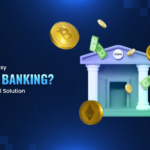Blockchain financial services refer to the use of blockchain technology to provide financial services such as payments, remittances, lending, asset management, and more. These services aim to increase transparency, security, and efficiency in the financial sector by leveraging the decentralized, secure, and transparent nature of blockchain technology. Examples of blockchain financial services include cryptocurrencies, decentralized exchanges, stablecoins, and security token offerings.
This blog will expound upon the revolutionary concept of blockchain financial services, a paradigm shift in the way we store and transfer information and value. The blockchain, at its core, is a distributed ledger system that utilizes cryptography to ensure the integrity of its records, creating a trustless and immutable database. With its potential to eliminate intermediaries and increase transparency, blockchain technology has the power to disrupt traditional financial systems and create new opportunities for economic growth and innovation.
The components of blockchain financial services include:
Decentralized Ledger Technology: A decentralized ledger that records transactions on multiple nodes in a secure and transparent manner.
Cryptocurrency: A digital asset that operates as a medium of exchange using cryptography to secure financial transactions and control the creation of new units.
Smart Contracts: Self-executing computer programs that automatically enforce the terms of a contract between parties.
Tokenization: The process of converting assets, such as stocks or real estate, into digital tokens that can be traded on a blockchain.
Decentralized Exchanges: A platform that allows users to trade cryptocurrencies and other digital assets in a decentralized manner, without the need for a central authority.
Stablecoins: Cryptocurrencies that are pegged to a stable asset, such as the US dollar, to minimize price volatility.
Security Token Offerings: The issuance and trading of digital tokens that represent ownership in a company, real estate, or another asset.
Digital Identity Management: The use of blockchain technology to securely store and manage personal information and identity.
These components work together to provide secure, transparent, and efficient financial services to individuals and businesses.
Blockchain financial services are financial services that use a blockchain network to securely and transparently track financial transactions. The key feature of a blockchain network is that it maintains a decentralized and immutable ledger of all transactions, which allows for greater transparency and security. In the context of financial services, this technology can be used for various applications such as payment processing, digital asset management, identity verification, and supply chain financing, among others. The transactions are verified and recorded on multiple nodes in the network, reducing the risk of fraudulent activity and ensuring the accuracy of the financial data. This results in faster and more efficient transactions, lower transaction costs, and reduced risks for both consumers and financial institutions.
Built Your Own Blockchain Applications in Finance
Schedule Free DemoTop 10 Use cases of Blockchain Financial Services
- Digital Payments: Facilitating secure and fast peer-to-peer transactions without the need for intermediaries.
- Trading and Exchange: Streamlining stock and cryptocurrency trading through decentralized exchanges.
- Supply Chain Financing: Improving transparency and efficiency in supply chain financing processes.
- Cross-border payments: Reducing the cost and increasing the speed of international money transfers.
- Loan Origination and Servicing: Automating loan origination and servicing processes to reduce operational costs and increase accuracy.
- Insurance: Improving the efficiency and transparency of insurance claims processing and management.
- Asset Management: Streamlining the management of assets like real estate, fine art, and precious metals through tokenization.
- Fundraising: Enabling startups to raise capital through Initial Coin Offerings (ICOs) and Security Token Offerings (STOs).
- Microfinance: Providing financial services to underserved populations through decentralized lending platforms.
- Compliance and Risk Management: Enhancing regulatory compliance and risk management through the immutable nature of blockchain technology.
Conclusion
Blockchain technology has the potential to revolutionize the financial services industry by increasing efficiency, improving transparency, and enhancing security. The decentralized and automated processes of blockchain can help financial services companies reduce operational costs and increase the speed and accuracy of financial transactions, thereby improving the overall customer experience and building trust with clients. Additionally, the use of cryptography and decentralized architecture in blockchain technology can provide a more secure environment for financial transactions, reducing the risk of fraud and cyber-attacks. By adopting blockchain technology in developing blockchain financial services, companies can stay ahead of the competition and meet the evolving demands of the market. If blockchain financial services development is in your radar, connect with Antier today who have a great track record of delivering some extraordinary blockchain projects in the past.







